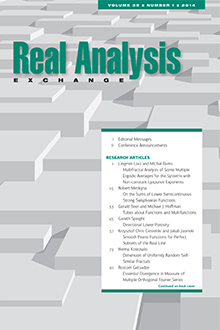Abstract
In this article we will prove that if the continuous closed curve \(\gamma : [0, 1] \rightarrow \mathbb{R}^2\) has finite \(p\)-variation with \(p < 2\), then \begin{equation*} (\iint\limits_{\mathbb{R}^2}|\eta(\gamma, (x, y))|^q \,dx \,dy)^{1/q} \le (\frac{1}{2})^\frac{1}{q}(\zeta(\frac{2}{pq})-1)(||\gamma||_{p, [0, 1]})^{\frac{2}{q}} \end{equation*} for all \(q \in [1, \frac{2}{p})\), where \(\eta(\gamma, (x, y))\) is the winding number of \(\gamma\) at \((x, y), \zeta\) is the Reimann zeta function, and \(||\gamma||_{p, [0, 1]}\) is the \(p\)-variation of \(\gamma\) on the interval \([0, 1]\). Our main contribution is that we have explicitly given a bound by known constants, and we have found this by an elementary proof. We are going to be using a method introduced by L.C. Young in 1936.
Citation
George Galvin. "An Elementary Proof of an Isoperimetric Inequality for Paths with Finite p-Variation." Real Anal. Exchange 43 (1) 67 - 76, 2018. https://doi.org/10.14321/realanalexch.43.1.0067
Information





